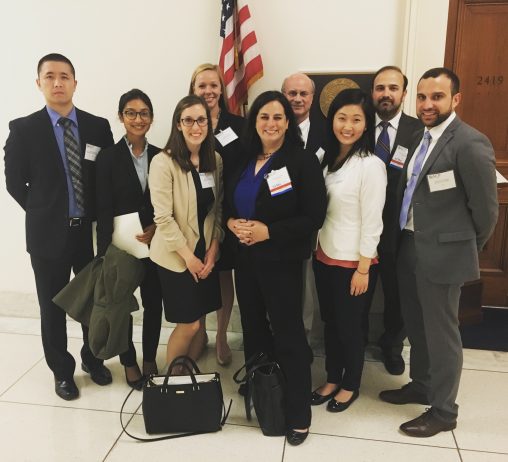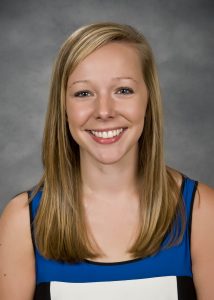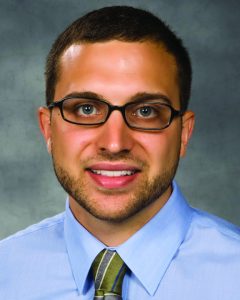
Casey Smiley, back row, left, and Nick Christian, far right, were part of a team of medical students and doctors from Ohio that participated in the American College of Physicians Leadership Day in Washington, D.C. They met with their senators and representatives in congressional visits.
Two Wright State University Boonshoft School of Medicine students spoke with legislators and legislative aides from Ohio on Capitol Hill in Washington, D.C., on May 24 as part of the American College of Physicians Leadership Day.
The annual advocacy day of the American College of Physicians (ACP) brought together 430 ACP members from 47 states and the District of Columbia. They met with their senators and representatives in congressional visits. Medical students and doctors were divided into teams based on the state where they live.
Third-year medical student Casey Smiley and fourth-year medical student Nick Christian represented the Boonshoft School of Medicine. Their team met with Sen. Rob Portman and Reps. Steve Stivers (15th District), Brad Wenstrup (2nd District) and Bill Johnson (6th District) in person. They also met with legislative aides for Reps. Steve Chabot (1st District), Warren Davidson (8th District) and Patrick Tiberi (12th District).

Casey Smiley
Smiley discussed the opioid addiction epidemic with the legislators and legislative aides.
“In one year of clinical experience, I have seen the opioid addiction epidemic touch the lives of so many patients and friends,” said Smiley, who plans to practice internal medicine and would like to work in an academic medicine program. “I shared personal stories about my time in the hospital and clinics working with patients addicted to opioids. Personal anecdotes were key to conveying the importance and urgency of these issues during these meetings.”
A patient during her third year of medical school introduced her to the severity of the opioid epidemic. He began using drugs when he was stressed.
“He had an infection and needed antibiotics but kept leaving the hospital to use drugs,” she said. “In the end, he had to have part of his foot amputated because he was not able to stop using heroin.”
She also shared about a friend’s brother who was addicted to opioids.
“His addiction eventually cost him his life,” she said. “I watched his family suffer, and I felt hopeless at the time. I am so thankful to be able to make a difference by talking with our congressional representatives.”
This was the second year that Christian attended the event. His role on the team was to speak about improving the care of patients with chronic disease. The ACP is asking Congress to pass legislation that would allow physicians to be reimbursed for extra and innovative care solutions for patients with chronic disease in order to spend Medicare dollars more wisely. These care solutions include telemedicine and billing for extra time spent working on patient cases.

Nick Christian
“The sickest patients are costing our health care system so much money. These are the patients that provide the most opportunity for cost reduction,” said Christian, who graduated from medical school on May 26 and will begin a residency in internal medicine this summer at the University of Texas at Austin Dell Medical School in Austin. “By providing incentives to physicians for taking more time with patients with complex needs, we will avoid unnecessary hospitalizations and prevent the downward spiral of most chronic illnesses.”
Even as a resident, Christian would love to continue ACP Leadership Day. “The Texas chapter of the ACP is very engaged in advocacy,” he said. “There will be plenty of opportunity for me to be involved.”

 Wright State alum Lindsay Aitchison fulfills childhood space-agency dream
Wright State alum Lindsay Aitchison fulfills childhood space-agency dream  Wright State business professor, alumnus honored by regional technology organizations
Wright State business professor, alumnus honored by regional technology organizations  Wright State University Foundation awards 11 Students First Fund projects
Wright State University Foundation awards 11 Students First Fund projects  Gov. DeWine reappoints Board Treasurer Beth Ferris and names student Ella Vaught to Wright State Board of Trustees
Gov. DeWine reappoints Board Treasurer Beth Ferris and names student Ella Vaught to Wright State Board of Trustees  Joe Gruenberg’s 40-Year support for Wright State celebrated with Honorary Alumnus Award
Joe Gruenberg’s 40-Year support for Wright State celebrated with Honorary Alumnus Award 